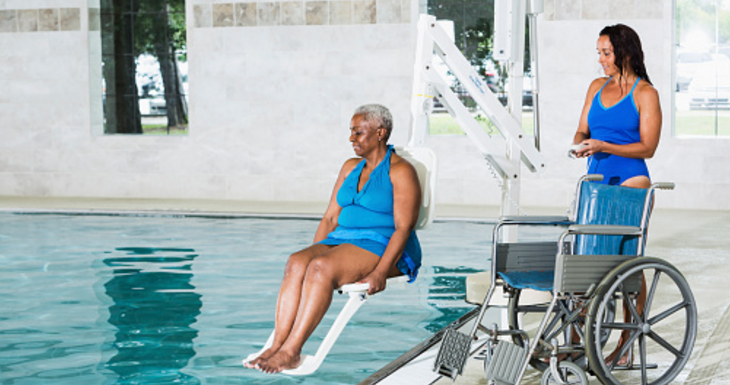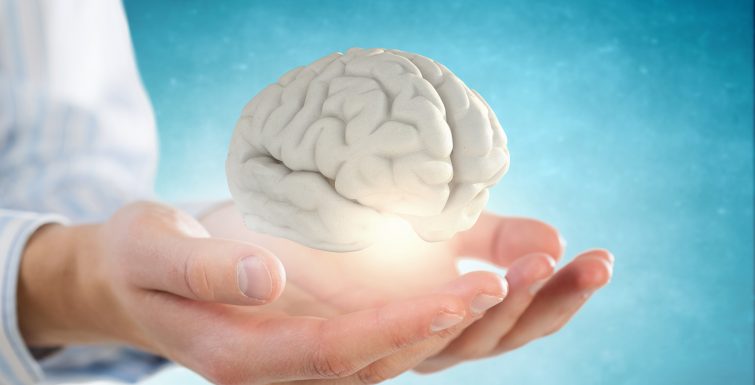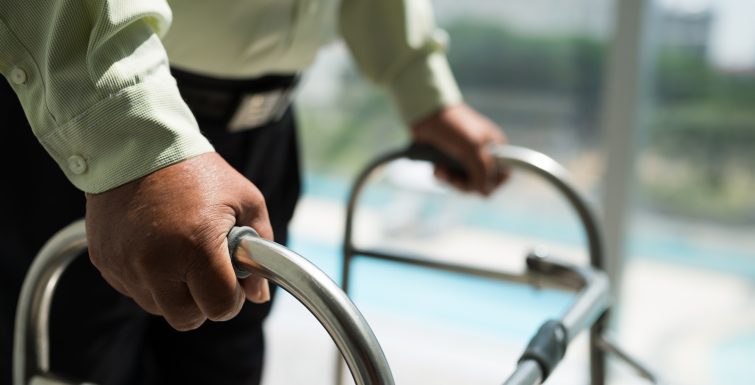Guest Blogger: Carolyn Rocca, Student Occupational Therapist
Water has long been associated with health and healing, making it an excellent tool for rehabilitation. Aquatic therapy, also referred to as pool therapy or hydrotherapy, is one way in which water can be used for therapeutic purposes following injury or illness.
Aquatic therapy refers to water-based treatments or exercises aimed to enable physical rehabilitation, fitness, and relaxation for therapeutic purposes. Treatments and exercises are performed while floating, partially submerged, or fully submerged in water, usually in specialized temperature-controlled pools. The key difference between this form of therapy and land therapy is that movement is facilitated by the physical properties of water, particularly it’s density and specific gravity, hydrostatic pressure, buoyancy, viscosity, and thermodynamics (Becker, 2009).
Due to the specific facilitating properties of water, aquatic therapy can have several benefits for people who have loss or restriction of joint motion, strength, mobility, or function as a result of a specific disease or injury. Aquatic therapies are beneficial in the management of musculoskeletal issues, neurological conditions, and cardiopulmonary problems. More specifically, there is evidence to support that people with fibromyalgia, arthritis, multiple sclerosis, cerebral palsy, stroke, and chronic pain, as well as people who have undergone surgeries such as total knee and total hip replacements, can significantly benefit from aquatic therapy (CARI, 2014).
The benefits of hydrotherapy will depend on the purpose of why it is being used in your rehabilitation plan, what it is aiming to target, and the type of exercise being completed in the water. In general, there is evidence to support that within a wide range of ages and abilities, hydrotherapy may help people to increase their endurance and strength, improve balance and postural control, reduce perceived pain and muscle spasms, reduce joint pain and stiffness, aid in gait retraining, and improve functional mobility. Additional benefits can include the facilitation of relaxation, improved quality of life, as well as providing opportunities for socialization (CARI, 2014).
A key to the success of many aquatic therapy procedures is the constant attendance and guidance provided by a trained therapist. This can be any rehabilitation professional, such as a physical therapist, occupational therapist, PTA/OTA, etc., who has taken additional and specific training in basic or advanced aquatic physical therapy. The rehab professional’s expertise will be able to match your abilities with the appropriate properties of water to achieve an optimum balance between facilitation and challenge. By adjusting the immersion temperature, type and intensity of activity, level of resistance, use of equipment, and treatment duration the therapist will be able to assist your recovery by gradually increasing the amount of challenge to eventually help you to transition to land exercises.
An added bonus to the therapeutic benefits of aquatic therapy is that it can help to introduce or re-connect you to a leisure interest, and can offer a social outlet. For example, a current client of mine has recently begun pool therapy following injuries sustained in a motor-vehicle collision. Not only will this help in her recovery while she begins to regain strength and function in her legs, but will also re-connect her to her passion for swimming, as this was something she loved to do with friends prior to her accident. Additionally, there is evidence to support that infants and toddlers with mobility impairments that engaged in aquatic therapy can experience significant functional gains in mobility compared to children who solely received land therapy, and that their parents noticed an increase in their socialization and enjoyment while in the pool. In this particular study, the children’s parents then reported an increased willingness and comfort in bringing their children to community pools following aquatic therapy (McManus, & Kotelchuck, 2007), therefore further increasing their future leisure and social opportunities.
Thus, aquatic therapy has the potential to improve physical function, as well as increase community involvement, socialization opportunities, and participation in physical activities. Additionally, this form of therapy can be appropriate and beneficial for all ages and abilities. If you feel that aquatic therapy may be a great addition to your rehabilitation and recovery, speak to your rehabilitation professional about some of the opportunities available in your community.
References & Resources
Becker, B. E. (2009). Aquatic therapy: scientific foundations and clinical rehabilitation applications. PM&R, 1(9), 859-872.
Canadian Aquatic Rehab Instructors (CARI) website: http://www.aquaticrehab.ca/
Canadian Aquatic Rehab Instructors (CARI) website link to research (2014). Retrieved from http://www.aquaticrehab.ca/research
McManus, B. M., & Kotelchuck, M. (2007). The effect of aquatic therapy on functional mobility of infants and toddlers in early intervention. Pediatric Physical Therapy, 19(4), 275-282.













